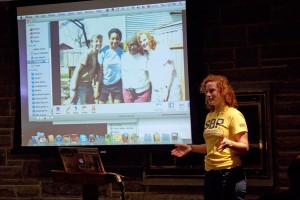Last month, the student organization ReNew Orleans hosted a teach-in on issues in post-Hurricane Katrina New Orleans. As part of the group’s mission to raise awareness of social and environmental issues in the area, the event featured presentations by professors from Ithaca College’s anthropology and environmental science departments. Other speakers included the director of a local non-profit organization, Love Knows No Bounds, and the co-founder of the St. Bernard Project, a non-profit in Chalmette, La., that helps survivors of the hurricane return home.

The St. Bernard Project educates its employees and volunteers on the real reasons behind the Hurricane Katrina catastrophe — the ones that continue to plague the city today. This summer, as a site supervisor for SBP, I taught volunteers how to rebuild homes that were damaged in the storm.
As I learned more about New Orleans, I understood that sociopolitical and environmental issues are still prevalent there. For instance, the gaping hole between the wealth of the lower and upper classes and the disregard of human well being in favor of corporate prosperity are but a few issues faced in the area and across the U.S.
The cause of the widespread devastation wasn’t the storm itself as much as it was the intense flooding that followed. The levees, built just one year prior to the storm, broke because of the poor design of the U.S. Army Corps of Engineers. Also, the rezoning of flood areas prompted insurance companies to tell homeowners they only needed coverage for hurricanes, not for floods.
The problems that led to the flooding, however, date back to the 1960s. During this time, the Mississippi River Gulf Outlet was constructed to increase efficiency and ease for ships coming into the Port of New Orleans. But by the time Katrina made landfall, the MRGO had already depleted many of the wetlands. It had introduced salt water into an ecosystem dependent on fresh water. This ruined the buffer that healthy wetlands offered by slowing down hurricanes before they make landfall.
Moral failings also occurred both before and after Katrina wreaked havoc on New Orleans. The unwillingness of local governments to create a city-wide evacuation plan that included transportation for people of lower socioeconomic status left many stranded. The notoriously corrupt New Orleans Police Department carried out racist and classist actions. Contractor fraud prevented homeowners from returning to the city years later.

The logic in this country says it is acceptable to sacrifice human life and the dignity of those at the bottom of the hierarchy as long as it serves those at the top. It is time to put an end to that logic.
Students at the college must address the systemic issues, not just in Ithaca, but also in each of their hometowns, to prevent societal devastation. The measure of our society should be how well we take care of one another. When it came to Katrina, we failed. But we don’t have to fail again.
Lyndsey Lyman is a junior culture and communication major. Email her at [email protected]







